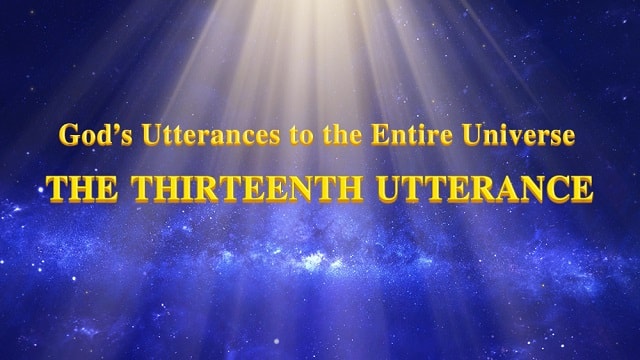Are You a True Believer in God?
There are many things I hope for you to achieve, yet not all of your actions, not everything about your lives, are able to fulfill what I ask, so I have no choice but to come straight to the point and explain to you My will. Given that your discernment is poor and your appreciation is likewise poor, you are almost utterly ignorant of My disposition and essence—and thus it is a matter of urgency that I inform you about them. No matter how much you previously understood, regardless of whether you wish to understand these issues, I must still explain them to you in detail. These issues are not entirely foreign to you, yet you lack much understanding, much familiarity, with the meaning contained within them. Many of you have only some dim understanding, and a partial and incomplete one at that. To help you to better practice the truth—to better practice My words—I think these are the issues you must be aware of first and foremost. If not, your faith will remain vague, hypocritical, and filled with the trappings of religion. If you do not understand the disposition of God, then it will be impossible for you to do the work you should do for Him. If you do not know the essence of God, then it will be impossible for you to have reverence and fear toward Him; instead, there will be only heedless perfunctoriness and prevarication, and moreover, incorrigible blasphemy. Although understanding God’s disposition is indeed important, and knowing God’s essence cannot be overlooked, no one has ever thoroughly examined or delved into these issues. It is plain to see that you have all dismissed the administrative decrees I have issued. If you do not understand the disposition of God, then you will be very likely to offend His disposition. Offending His disposition is tantamount to provoking the ire of God Himself, in which case the ultimate fruit of your actions will be the violation of the administrative decrees. Now you should realize that when you know God’s essence, so too can you understand His disposition—and when you understand His disposition, so too will you have understood the administrative decrees. Needless to say, much of what is contained within the administrative decrees touches upon the disposition of God, but not all of His disposition is expressed within the administrative decrees; hence, you must go a step further in developing your understanding of God’s disposition.
I speak with you today not as in ordinary conversation, so it behooves you to approach My words carefully and, moreover, to reflect deeply upon them. What I mean by this is that you have devoted too little effort to the words I have spoken. You are even less willing to ponder the disposition of God; seldom does anyone put effort into it. For this reason I say that your faith is nothing more than grandiloquence. Even now, not a single one of you has dedicated any serious effort to your most vital weakness. You have let Me down after all the pains I have taken for you. No wonder that you have no regard for God and your lives are devoid of truth. How can such people be deemed saints? Heaven’s law will not tolerate such a thing! Since you have so little understanding of this, I have no choice but to expend more breath.
The disposition of God is a subject that seems very abstract to everyone and is, moreover, one that is not easy for anyone to accept, for His disposition is unlike a human being’s personality. God, too, has His own emotions of joy, anger, sorrow, and happiness, but these emotions differ from those of man. God is what He is and He has what He has. All that He expresses and reveals are representations of His essence and of His identity. What He is and what He has, as well as His essence and identity, are things that cannot be replaced by any man. His disposition encompasses His love for mankind, solace of mankind, hatred of mankind, and even more, a thorough understanding of mankind. The personality of man, however, may be optimistic, lively, or unfeeling. The disposition of God is one that belongs to the Ruler of all things and living beings, to the Lord of all creation. His disposition represents honor, power, nobility, greatness, and most of all, supremacy. His disposition is the symbol of authority, the symbol of all that is righteous, the symbol of all that is beautiful and good. More than that, it is a symbol of Him who cannot be overcome or invaded by the darkness and any enemy force, as well as a symbol of Him who cannot be offended (nor will He tolerate being offended) by any created being. His disposition is the symbol of the highest power. No person or persons can or may disturb His work or His disposition. But the personality of man is no more than a mere symbol of the slight superiority of man over beast. Man in and of himself has no authority, no autonomy, and no ability to transcend the self, but is in his essence one who cowers at the mercy of all manner of people, events, and things. The joy of God is due to the existence and emergence of righteousness and light, because of the destruction of darkness and evil. He takes delight in bringing the light and a good life to mankind; His joy is a righteous joy, a symbol of the existence of all that is positive and, even more, a symbol of auspiciousness. The anger of God is due to the harm that the existence and interference of injustice brings upon His mankind, because of the existence of evil and darkness, because of the existence of things that drive out the truth, and even more, because of the existence of things that oppose what is good and beautiful. His anger is a symbol that all things negative no longer exist and, even more than that, it is a symbol of His holiness. His sorrow is due to mankind, for whom He has hopes but who has fallen into darkness, because the work He does on man does not come up to His expectations, and because the mankind He loves cannot all live in the light. He feels sorrow for the innocent mankind, for the honest but ignorant man, and for the man who is good but lacking in his own views. His sorrow is a symbol of His goodness and of His mercy, a symbol of beauty and of kindness. His happiness, of course, comes from defeating His enemies and gaining the good faith of man. More than this, it arises from the expulsion and destruction of all enemy forces, and because mankind receives a good and peaceful life. The happiness of God is unlike the joy of man; rather, it is the feeling of garnering good fruits, a feeling even greater than joy. His happiness is a symbol of mankind breaking free of suffering from this time forth, and a symbol of mankind entering a world of light. The emotions of mankind, on the other hand, all arise for the sake of his own interests, not for righteousness, light, or what is beautiful, and least of all for the grace bestowed by Heaven. The emotions of mankind are selfish and belong to the world of darkness. They do not exist for the sake of the will, much less for the plan of God, and so man and God can never be spoken of in the same breath. God is forever supreme and ever honorable, while man is forever base, forever worthless. This is because God is forever making sacrifices and devoting Himself to mankind; man, however, forever takes and strives only for himself. God is forever taking pains for mankind’s survival, yet man never contributes anything for the sake of the light or for righteousness. Even if man makes an effort for a time, it cannot withstand a single blow, for the effort of man is always for his own sake and not for others. Man is always selfish, while God is forever selfless. God is the source of all that is just, good, and beautiful, while man is he who succeeds to and makes manifest all ugliness and evil. God will never alter His essence of righteousness and beauty, yet man is perfectly capable, at any time and in any situation, of betraying righteousness and straying far from God.
Every sentence I have spoken contains within it the disposition of God. You would do well to ponder My words carefully, and you will surely profit greatly from them. The essence of God is very difficult to grasp, but I trust that you all have at least some idea about the disposition of God. I hope, then, that you will have more to show Me of things you have done that do not offend the disposition of God. Then will I be reassured. For example, keep God in your heart at all times. When you act, do so according to His words. Seek out His intentions in all things, and refrain from doing that which disrespects and dishonors God. Even less should you put God in the back of your mind to fill the future void in your heart. If you do this, you will have offended the disposition of God. Again, supposing you never make blasphemous remarks or complaints against God throughout your life, and again, supposing you are able to discharge properly all that He has entrusted to you and also to submit to all His words throughout your life, then you will have avoided transgressing against the administrative decrees. For example, if you have ever said, “Why do I not think that He is God?” “I think that these words are nothing more than some enlightenment of the Holy Spirit,” “In my opinion, not everything God does is necessarily right,” “The humanity of God is not superior to mine,” “The words of God are simply not believable,” or other such judgmental remarks, then I exhort you to confess and repent your sins more often. Otherwise, you will never have a chance at forgiveness, for you offend not a man, but God Himself. You may believe that you are judging a man, but the Spirit of God does not consider it that way. Your disrespect of His flesh is equal to disrespecting Him. This being so, have you not offended God’s disposition? You must remember that all that is done by the Spirit of God is done in order to safeguard His work in the flesh and in order that this work be done well. If you neglect this, then I say that you are someone who will never be able to succeed in believing in God. For you have provoked the wrath of God, and so He shall use fitting punishment to teach you a lesson.
Coming to know the essence of God is no trifling matter. You must understand His disposition. In this way, you will, gradually and unknowingly, come to know the essence of God. When you have entered into this knowledge, you will find yourself stepping into a higher and more beautiful state. In the end, you will come to feel ashamed of your hideous soul, and, moreover, will feel that there is nowhere to hide from your shame. At that time, there will be less and less in your conduct to offend the disposition of God, your heart will come closer and closer to that of God, and a love for Him will gradually grow in your heart. This is a sign of mankind entering a beautiful state. But as yet, you have not attained this. As you all rush about for the sake of your destiny, who has any interest in trying to know the essence of God? Should this continue, you will unknowingly transgress against the administrative decrees, for you understand far too little of the disposition of God. So is not what you do now laying down a foundation for your offenses against the disposition of God? That I ask you to understand the disposition of God is not divorced from My work. For if you transgress against the administrative decrees often, who among you will escape punishment? Would My work then not have been entirely in vain? Therefore, I still ask that, in addition to scrutinizing your own conduct, you be cautious in the steps you take. This is the higher demand that I make of you, and I hope that you will all consider it carefully and give it your earnest regard. Should a day come when your actions provoke Me to a towering rage, then the consequences will be yours alone to consider, and there will be no one else to bear the punishment in your place.





